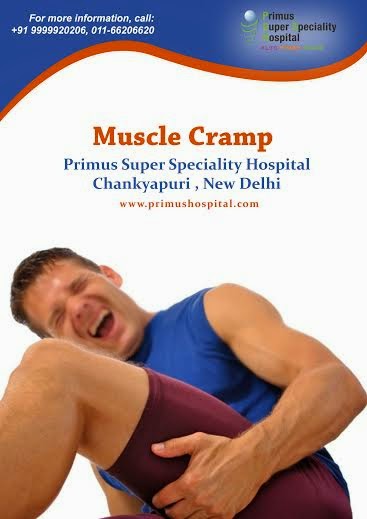Muscle Cramp
Muscle Cramp -Causes and Treatment
Muscle cramp is an forcibly and involuntarily contracted muscle that does not relax. The muscles that can be controlled voluntarily, such as those of our legs and arms , they alternately contract and relax as we move our limbs. A muscle (or even a few fibers of a muscle) that involuntarily (without consciously willing it) contracts is in a "spasm." If the spasm is forceful and sustained, it becomes a cramp. Muscle cramps often cause a visible or palpable hardening of the involved muscle.
Muscle cramps are extremely common. Almost everyone (one estimate is about 95%) experiences a cramp at some time in their life. Muscle cramps are common in adults and become increasingly frequent with aging. True cramps can occur in a variety of circumstances as follows.- Injury, Vigorous activity, dehydration, spinal cord injury , pinched nerve in the neck or back, Body fluid shifts, Low blood calcium, magnesium, low potassium.
Causes
Overuse of Muscle
Dehydration
Muscle strain
Holding a position for a prolonged period of time
Most Muscle Cramps are harm less, but few may be associated with some underlying medical condition
Inadequate blood supply
Narrowing of the arteries that carry blood to your legs can generate cramp-like pain in your legs and feet while you're exercising (arteriosclerosis of the extremities). These cramps usually go away soon after you stop exercising.
Nerve compression.
Compression of nerves in the spine (lumbar stenosis) also can produce cramp-like pain in your legs. The pain worsens the longer you walk. Walking in a slightly flexed position — such as you would employ when pushing a shopping cart ahead of you — may improve or delay the onset of your symptoms.
Mineral depletion.
Too little potassium, calcium or magnesium in your diet can contribute to leg cramps. Diuretics - medications often prescribed for high blood pressure-may also deplete these minerals.Cramps can be very painful. Stretching or gently massaging the muscle can relieve this pain
Muscle cramps are more likely when you exercise in hot weather because sweat drains your body fluids, salt & minerals
FOR MORE INFORMATION
CALL AT PRIMUS SPORTS INJURY CENTER & Dr Surya Bhan HOD & FOR MORE INFORMATION Director of Orthopaedics Primus Hospital Super Speciality Hospital
Chandragupta Marg Chanakyapuri, New Delhi- 110021
For appointments : +91 9999920206, 6620 6630, 6620 6640
For Emergency : +91 11 6620 6620
Fax : +91 116620 6650, 2611 2633
Email : info@primushospital.com
Website : www.primushospital.com
Muscle cramp is an forcibly and involuntarily contracted muscle that does not relax. The muscles that can be controlled voluntarily, such as those of our legs and arms , they alternately contract and relax as we move our limbs. A muscle (or even a few fibers of a muscle) that involuntarily (without consciously willing it) contracts is in a "spasm." If the spasm is forceful and sustained, it becomes a cramp. Muscle cramps often cause a visible or palpable hardening of the involved muscle.
Muscle cramps are extremely common. Almost everyone (one estimate is about 95%) experiences a cramp at some time in their life. Muscle cramps are common in adults and become increasingly frequent with aging. True cramps can occur in a variety of circumstances as follows.- Injury, Vigorous activity, dehydration, spinal cord injury , pinched nerve in the neck or back, Body fluid shifts, Low blood calcium, magnesium, low potassium.
Causes
Overuse of Muscle
Dehydration
Muscle strain
Holding a position for a prolonged period of time
Most Muscle Cramps are harm less, but few may be associated with some underlying medical condition
Inadequate blood supply
Narrowing of the arteries that carry blood to your legs can generate cramp-like pain in your legs and feet while you're exercising (arteriosclerosis of the extremities). These cramps usually go away soon after you stop exercising.
Nerve compression.
Compression of nerves in the spine (lumbar stenosis) also can produce cramp-like pain in your legs. The pain worsens the longer you walk. Walking in a slightly flexed position — such as you would employ when pushing a shopping cart ahead of you — may improve or delay the onset of your symptoms.
Mineral depletion.
Too little potassium, calcium or magnesium in your diet can contribute to leg cramps. Diuretics - medications often prescribed for high blood pressure-may also deplete these minerals.Cramps can be very painful. Stretching or gently massaging the muscle can relieve this pain
Muscle cramps are more likely when you exercise in hot weather because sweat drains your body fluids, salt & minerals
FOR MORE INFORMATION
CALL AT PRIMUS SPORTS INJURY CENTER & Dr Surya Bhan HOD & FOR MORE INFORMATION Director of Orthopaedics Primus Hospital Super Speciality Hospital
Chandragupta Marg Chanakyapuri, New Delhi- 110021
For appointments : +91 9999920206, 6620 6630, 6620 6640
For Emergency : +91 11 6620 6620
Fax : +91 116620 6650, 2611 2633
Email : info@primushospital.com
Website : www.primushospital.com


Comments
Post a Comment